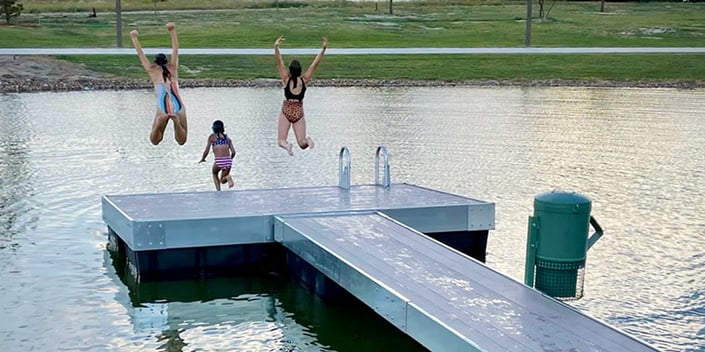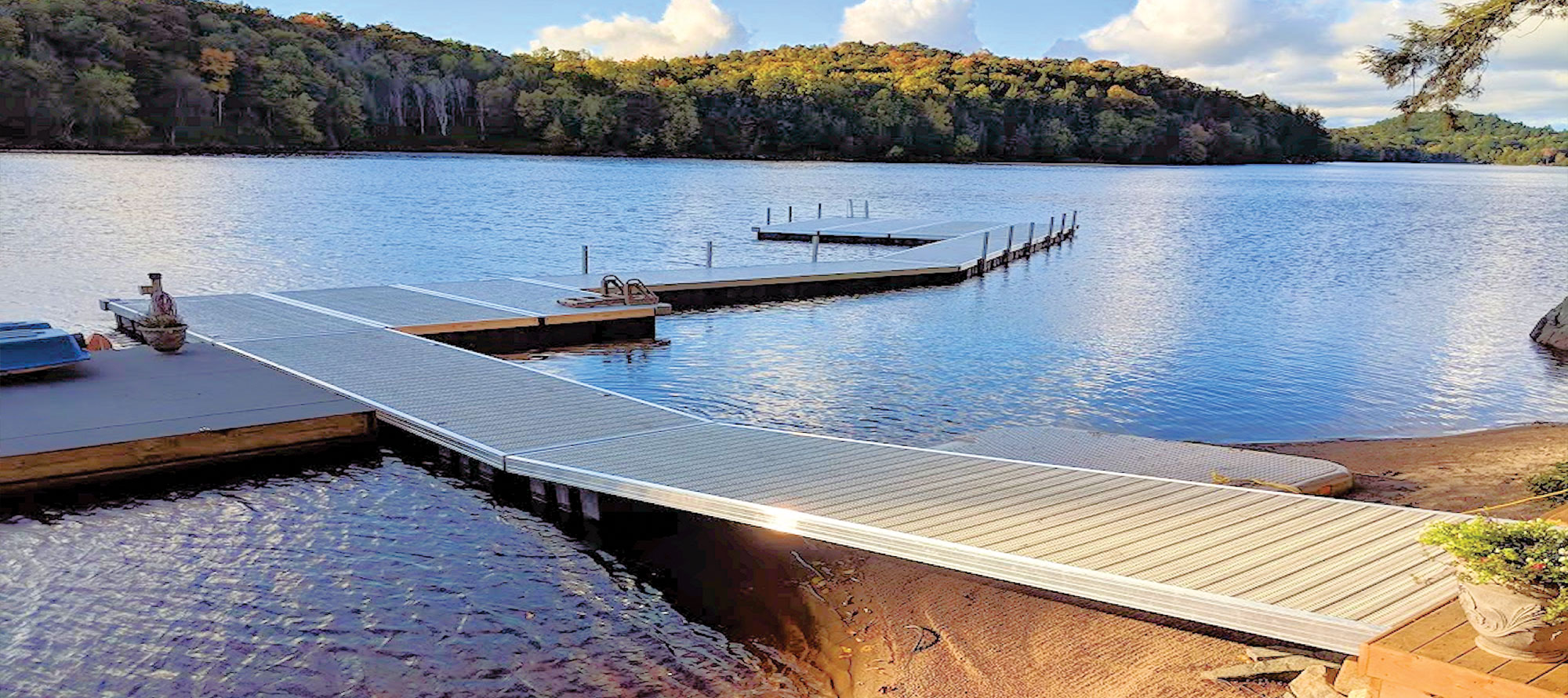Find the Perfect Floating Dock Builder to Bring Your Waterfront Vision to Life
Find the Perfect Floating Dock Builder to Bring Your Waterfront Vision to Life
Blog Article
Floating Docks: The Perfect Choice for Versatile Water Gain Access To
Floating docks existing an engaging remedy for a selection of water gain access to needs, providing flexibility that goes beyond conventional mooring choices. Their capacity to adjust to rising and falling water degrees while guaranteeing stability and safety and security makes them specifically useful for both recreational and industrial applications. Moreover, the modular nature of floating docks assists in personalization, satisfying particular needs. However, the subtleties of installment and upkeep, alongside the variety of applications, necessitate a closer exam to completely value their possible benefits and effects for waterway access approaches.
Benefits of Floating Docks
Floating docks offer countless benefits that enhance water access for different applications. Their capability to drop and rise with changing water degrees makes them especially useful in environments with fluctuating tides or seasonal variations. This adaptability makes sure that vessels can quickly tie without concern for the water's depth, giving a dependable platform for entertainment, commercial, and commercial usages.
Furthermore, floating docks are frequently constructed from long lasting products that stand up to corrosion, making them ideal for lasting usage in aquatic atmospheres. Their installment is commonly less intrusive than conventional fixed docks, reducing the environmental effect and promoting quicker release (floating docks). This flexibility enables for less complicated moving or reconfiguration according to customer requirements or ecological adjustments
Safety is another key advantage; floating docks can offer stable gain access to for individuals getting off or boarding from boats and reduce the threat of accidents linked with unstable surface areas. They can be made to accommodate a range of devices, such as cleats and fenders, improving capability. In general, floating docks represent an effective service for improving water access throughout varied sectors while advertising safety and security and ecological sustainability.

Types of Floating Docks
Various types of floating docks accommodate various requirements and environments, each made with specific functions to maximize performance. One of the most common kinds consist of modular docks, which include interlocking sections that enable very easy modification and development. These docks are ideal for recreational usage, as they can be customized to fit various boat sizes and water conditions.
One more preferred choice is the stationary floating dock, which continues to be anchored in position but drifts with transforming water degrees. dock company. This kind is especially matched for locations with minimal tidal changes, giving secure gain access to for fishing or swimming. In addition, there are drive-on docks, which feature a sloped design that permits watercrafts to easily drive on and off, making them ideal for personal watercraft and smaller sized vessels
For commercial applications, sturdy floating docks are offered, constructed from strengthened products to hold up against substantial tons and rough aquatic settings. Finally, eco-friendly floating docks use sustainable materials and styles to lessen ecological effect, frequently including functions like vegetation to sustain local wild animals. Understanding the numerous kinds of floating docks makes sure that users can pick one of the most suitable service for their details demands.
Installment Process Summary
A successful installation of floating docks calls for mindful preparation and attention to information to make sure ideal performance and safety. The first action involves examining the site problems, including water deepness, current, and prospective barriers. This analysis informs the option of the proper dock materials and layout customized to the particular atmosphere.
Next, getting necessary permits is crucial, as several jurisdictions have regulations pertaining to building and construction on water bodies. The installation can proceed once authorizations are protected. Begin by preparing the structure, which might entail anchoring systems or pilings tailored to the dock type and neighborhood problems.
Following the structure arrangement, set up the dock sections according to manufacturer specifications. Make certain that all elements are safely attached and aligned to endure ecological tensions. Setting the dock in the marked location, guaranteeing it is level and secure.

Maintenance Tips and Best Practices
After the installation process is full, continuous maintenance plays a crucial role in ensuring the durability and performance of floating docks. Regular inspections need to be carried out to recognize any kind of signs of damage, damages, or wear - floating docks. Check for any loose fittings, splits, or separation in the dock areas, as these can jeopardize structural honesty
Cleaning the dock is necessary to eliminate debris, algae, and other build-up that can impact its other appearance and safety. Use a gentle stress clean regularly to preserve tidiness without causing damages to the surface area. In addition, using a safety sealer every couple of years can aid boost durability and resist ecological wear.
Pay focus to the mooring lines and supports, ensuring they are safe and secure and cost-free from rust. Change any type of degraded components immediately to stay clear of hazards. Seasonal adjustments might likewise be required; during severe climate condition, strengthening the dock or rearranging can stop damages.
Applications for Floating Docks
Floating docks serve a multitude of applications, accommodating both industrial and entertainment requirements. In leisure setups, they provide seamless accessibility to waterways for tasks such as boating, angling, and swimming. Their flexible nature permits setup in differing water degrees, guaranteeing risk-free and steady access no matter tidal variations.
Commercially, floating docks are essential for marinas and beachfront organizations. They promote the docking of vessels, enabling efficient unloading and packing of goods. Their modular layout enables for easy growth or reconfiguration to suit altering company needs, making them excellent for boat rentals, tour operations, or angling charters.
Additionally, floating docks are utilized in ecological applications such as water study and environment reconstruction. They can serve as systems for clinical studies, keeping track of water quality, or carrying out wild animals surveys without troubling delicate ecosystems.
In industrial contexts, floating docks are utilized in building and construction tasks, providing accessibility to hard-to-reach locations for equipment and employees. Their adaptability, durability, and marginal influence on the atmosphere make them Get More Info an optimal option for a wide variety of applications, boosting both performance and accessibility in numerous water-based environments.
Final Thought
In link final thought, floating docks represent an optimal solution for varied water gain access to needs, owing to their versatility, durability, and modular layout. Floating docks serve as an important property for leisure, industrial, and environmental jobs, guaranteeing trustworthy accessibility to rivers and advertising lasting techniques in marine atmospheres.
Floating docks existing a compelling option for a selection of water gain access to requires, providing flexibility that transcends typical mooring alternatives.Floating docks offer many benefits that improve water gain access to for numerous applications. In general, floating docks stand for a reliable remedy for boosting water gain access to across diverse sectors while promoting safety and environmental sustainability.
Another prominent alternative is the stationary floating dock, which continues to be secured in place yet floats with transforming water degrees.In conclusion, floating docks stand for an optimal service for diverse water accessibility requires, owing to their flexibility, sturdiness, and modular design.
Report this page